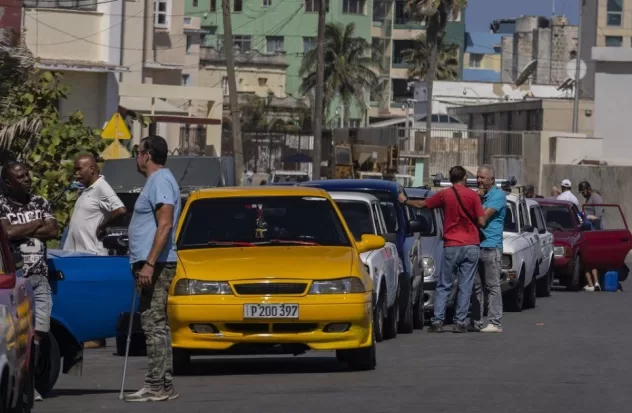HAVANA – Gasoline stations in Havana woke up with moderate lines and long faces among motorists this Friday, when the regime quintupled the price of gasoline as part of a plan to reduce the fiscal deficit.
“I’m going to buy a bicycle because gas is very expensive, some roller skates or some horse carts,” said Giovanni García, a 27-year-old courier, ironically, who was waiting to fill the tank of his old American car from the 1950s, in a station combustible in the west of the capital.
The price of a liter of regular gasoline went from 25 Cuban pesos (0.20 US cents) to 132 (1.10 dollars), which is equivalent to an increase of 428%, while special gasoline rose from 30 (0. 25 cents of the dollar) to 156 Cuban pesos (1.30 dollars), which represents +420%.
“Before with 1,000 pesos you bought about 40 liters but now I have to use 6,000 almost 7,000 to buy 40 liters,” García laments.
On Wednesday, the Minister of Energy and Mines, Vicente de la O Levy, announced for March 1 “new prices fuel retailers.” In his social network message, X also announced a “new electricity rate for consumers above 500 kWh.”
The objective is to “achieve the replenishment of fuels and cause savings in those who consume more” electricity, added the minister.
Concerned Cubans
The increase in fuel prices has generated concern among the population who fear an escalation of prices, amid the rampant inflation that has affected the country since 2021. Prices rose 30% in 2023 and 39% in 2022, according to official figures that experts considered underestimated.
“This (the purchase of fuel) must be left for first needs, everything that is hospitals and food,” said Juan Alberto Machín, 44 years old and a production assistant.
When this increase was announced in January, there were large crowds and concern among motorists. The authorities postponed its entry into force, scheduled for February 1, alleging “a cybersecurity incident in computer systems” that prevented the new prices from being applied.
“These prices for ordinary Cubans are harsh, they do not correspond” to “the normal salary” of a Cuban, says Neris Luis, a 57-year-old housewife, who assures that “everything is going to become more expensive.” (…) in the different expectations of life”.
For Cuban economist Pedro Monreal, with this increase “a distortion is ‘corrected'” by selling gasoline at the real price, but it will have “cross-cutting effects, increasing the distortion of salaries that are misaligned with the cost of living,” he said in his account. of X.
The average monthly salary is 4,200 Cuban pesos, equivalent to 35 dollars, at the official rate of 120 pesos. Cuba also has another rate for corporate banking transactions at 24 pesos to one dollar.
“A difficult day”
On Thursday, there were gigantic queues of motorists waiting to buy fuel before the increase. “Today is a difficult day. I fired at 3:00 in the morning and that was horrible,” said a user in one of the multiple WhatsApp groups that the population uses to find out about establishments that have gasoline.
The government reported that of 613 gas stations in the country, 30 will be to purchase energy in dollars. One of the latter looked almost empty this Friday.
Authorities postponed the fuel increase for wholesalers, including collective taxis, but some began raising their prices since January when the measure was announced. They also extended a planned increase in liquefied gas.
Chronic fuel crisis
Cuba, which lacks sufficient foreign currency, faces a chronic fuel crisis, which worsened in April 2023. The ruler appointed by the Castro regime, Miguel Díaz-Canel, attributed it to the non-compliance of commitments by countries that supply crude oil to the island.
In 2023, the country imported 203,000 tons of gasoline, when the demand in the country is 360,000 tons, according to official data.
Venezuela is Cuba’s main supplier of crude oil, while Mexico and Russia have contributed since last year to alleviating the island’s severe deficit.
Cuba faces its worst economic crisis in three decades due to the effects of the pandemic, the strengthening of the United States embargo, corruption and internal weaknesses due to a monetary reform that began three years ago and did not have the expected results.
Source: With information from AP

